

Responsabilité de l'hébergeur de contenus sur l'Internet. Un article de jurispedia, le droit partagé.
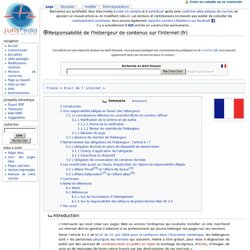
France > Droit de l'internet > Introduction L’internaute qui veut créer ses pages Web ou encore l’entreprise qui souhaite installer un site marchand sur Internet doit en général s’adresser à un professionnel qui pourra héberger ses pages sur ses serveurs. Selon l’article 6 I 2 de la loi du 21 juin 2004 pour la confiance dans l’économie numérique , les hébergeurs sont « les personnes physiques ou morales qui assurent, même à titre gratuit, pour mise à disposition du public par des services de communication au public en ligne , le stockage de signaux, d’ écrits , d’images, de sons ou de messages de toute nature fournis par des destinataires de ces services ».
Safe Harbor DMCA. The Digital Millennium Copyright Act ( DMCA ) is a United States copyright law that implements two 1996 treaties of the World Intellectual Property Organization (WIPO).
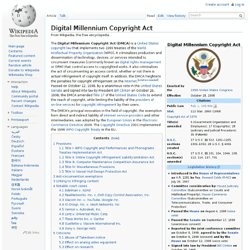
It criminalizes production and dissemination of technology, devices, or services intended to circumvent measures (commonly known as digital rights management or DRM) that control access to copyrighted works. It also criminalizes the act of circumventing an access control, whether or not there is actual infringement of copyright itself. In addition, the DMCA heightens the penalties for copyright infringement on the Internet . [ citation needed ] Passed on October 12, 1998, by a unanimous vote in the United States Senate and signed into law by President Bill Clinton on October 28, 1998, the DMCA amended Title 17 of the United States Code to extend the reach of copyright, while limiting the liability of the providers of on-line services for copyright infringement by their users.
Provisions [ edit ] Edelman v. Viacom Inc. v. Exemple : Politique de Youtube. Manage your content on YouTube If you would like to submit a notification of alleged copyright infringement, get information on what to do if you believe your video has been removed in error, or get information on how to dispute a Content ID match, the resources below will help educate you about our easy-to-use rights management processes.
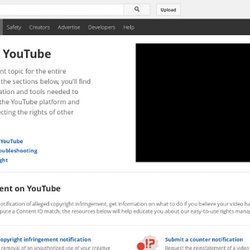
Copyright support and troubleshooting There’s a lot to learn about the world of copyright. If you'd like help diagnosing a copyright issue, the resources below are the best place to start. If your question is not answered here, please search our Help Center, where you will find additional information. How Content ID works Learn more about Content ID, a tool used by content owners to identify and claim their content in videos uploaded to YouTube. Exemple : Archive Of Our Own. Fragilité du statut des hébergeurs. Nous le savons tous, la question de l’exception culturelle à l’heure du numérique est au cœur des débats récents.
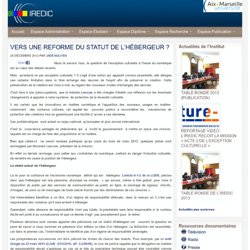
Mais qu’entend on par exception culturelle ? Il s’agit d’une notion qui apparaît comme essentielle, elle désigne une certaine limitation dans le libre échange des œuvres de l’esprit afin de préserver la création. Cette préservation de la création est mise à mal, au regard des nouveaux modes d’échanges des œuvres. Counter-Arguments Against ACTA. Below are arguments that can help you debunk the EU Commission's lies on ACTA, which are also relayed by pro-ACTA members of the EU Parliament.
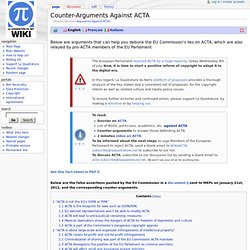
Get this fact-sheet in PDF Below are the false assertions pushed by the EU Commission in a document sent to MEPs on January 31st, 2012, and the corresponding counter-arguments. [edit] "ACTA is not the EU's SOPA or PIPA" In some important ways, ACTA is worse than SOPA. ACTA is the global blueprint for repressive laws such as SOPA: [edit] ACTA is the blueprint for laws such as SOPA/PIPA While SOPA/PIPA may have been put aside for a moment, ACTA is a global agreement negotiated outside of democratic arenas, pursuing a similar enforcement strategy, and meant to be imposed globally. La Quadrature article on the strategy behind ACTA [edit] EU elected representatives won't be able to modify ACTA If SOPA were to be adopted, the US Congress could amend or abrogate it.
SOPA/PIPA: Internet Blacklist Legislation. The "Stop Online Piracy Act"/"E-PARASITE Act" (SOPA), the "PROTECT IP Act" (PIPA), and the "Combating Online Infringement and Copyright Act" (COICA) were a series of bills promoted by Hollywood in the US Congress that would have a created a "blacklist" of censored websites.
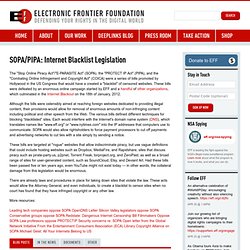
These bills were defeated by an enormous online campaign started by EFF and a handful of other organizations, which culminated in the Internet Blackout on the 18th of January, 2012. Although the bills were ostensibly aimed at reaching foreign websites dedicated to providing illegal content, their provisions would allow for removal of enormous amounts of non-infringing content including political and other speech from the Web. The various bills defined different techniques for blocking “blacklisted” sites. Each would interfere with the Internet's domain name system (DNS), which translates names like "www.eff.org" or "www.nytimes.com" into the IP addresses that computers use to communicate.
More resources: